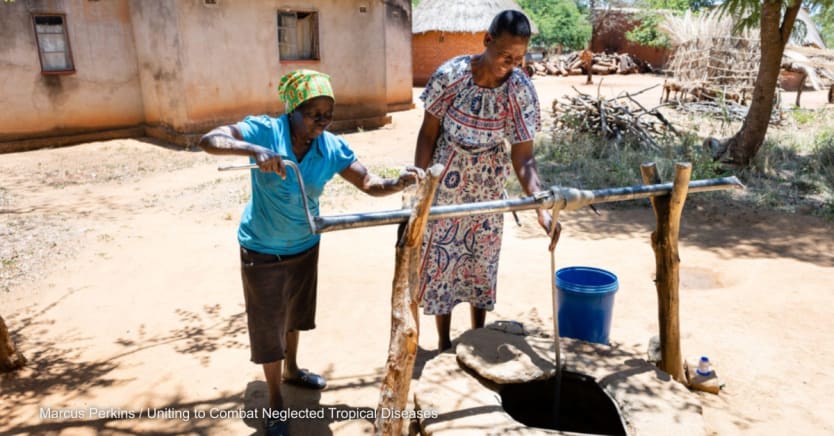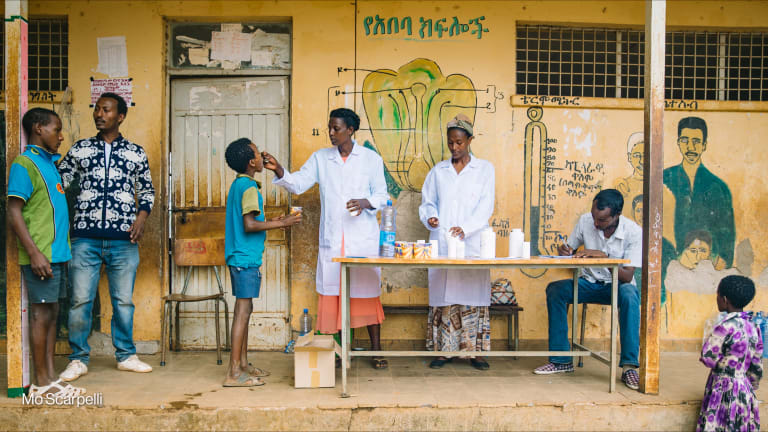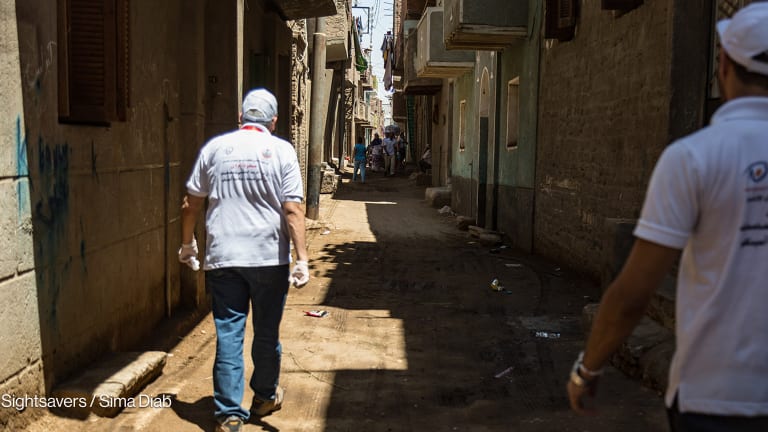
On World NTD Day, Jan. 30, we find ourselves at a critical juncture in the fight against neglected tropical diseases, or NTDs. By 2030, the World Health Organization’s NTD road map calls for 100 countries to achieve the elimination of at least one NTD and 90% fewer people needing treatment against NTDs.
Now, in 2025, we are at the halfway point toward achieving these goals. With so much at stake, this moment calls for renewed urgency and increased investment.
Against this backdrop, the theme of this year’s World NTD Day — “Unite. Act. Eliminate” — carries heightened significance. Not only does it underscore the power of partnership, it also reminds us that with dedicated action and continued investment, these diseases can truly be defeated once and for all.
A dual perspective: From national leadership to global action
My own journey with NTDs has been shaped by two perspectives. As the former vice president of The Gambia, I saw firsthand the devastating impact of diseases like schistosomiasis, or snail fever, and intestinal worms.
In our rural communities, these illnesses aren't just serious medical concerns — they are barriers to education, economic growth, and gender equity. Women are hit hardest, bearing the brunt of stigma and reduced opportunities, while also serving as caregivers for their families.
What is World NTD Day?
World Neglected Tropical Diseases Day, observed annually on Jan. 30, raises awareness and drives action against NTDs globally. Established on the anniversary of the 2012 London Declaration and WHO's first NTD road map, it commemorates progress, highlights ongoing challenges, and calls for continued investment to eliminate these diseases and support affected communities.
For more information, visit worldntdday.org.
During my tenure, our administration worked closely with policymakers, community health workers, and partners to incorporate NTD interventions into our national health strategies. We launched awareness campaigns, invested in water and sanitation, and prioritized mass drug administration programs in hard-to-reach areas.
Seeing how these measures could dramatically reduce the burden of illnesses like schistosomiasis and intestinal worms reinforced my belief that strong government leadership — especially around funding and policy — is key to breaking the cycle of poverty and marginalization these diseases create.
In my first six months as executive director at Uniting to Combat NTDs, I’ve witnessed how committed the global community is to ending NTDs — and how crucial adequate funding is for that commitment to translate into tangible results.
Despite persistent challenges, the pace of progress is remarkable. In 2024, seven countries eliminated at least one NTD. In the lead-up to World NTD Day 2025, Guinea announced the elimination of human African trypanosomiasis, or sleeping sickness as a public health problem. The country’s first-ever elimination of an NTD brings the total to 55 countries that have achieved this milestone — meaning we are more than halfway toward achieving the WHO road map goal on NTD elimination by 2030.
And in a historic triumph for Africa, on World NTD Day 2025, Niger became the first country on the continent to eliminate onchocerciasis, or river blindness.
These incredible achievements demonstrate that with political will, robust funding, and community-driven solutions, these terrible diseases can be pushed back — and ultimately defeated.
‘Unite. Act. Eliminate’ in action
Having witnessed the toll of NTDs and the power of coordinated efforts, “Unite. Act. Eliminate” is more than a theme, it’s a rallying cry. By strengthening collaboration, increasing political commitment, and expanding financial support, we can transform this midpoint into a genuine tipping point for ending NTDs once and for all.
Unite! — a spirit of collaboration
In recent years, a united partnership of governments, organizations, and the private sector has significantly accelerated progress in the fight against NTDs. The Kigali Declaration on NTDs, launched in 2022, marked a renewed and expanded commitment from governments, the private sector, and civil society in the fight against NTDs. It emphasizes country ownership and sustainable financing.
Now, 84 countries have endorsed the declaration — an encouraging testament. In 2023, at the 28th United Nations Climate Change Conference, or COP28, partners pledged $777 million for NTDs, including an expansion of the Reaching the Last Mile Fund to $500 million, while pharma industry partners have now committed over 28 billion units of medicines for NTDs from 2021 through 2030.
To keep this surge of support on track, we must continue drawing in new partners — including governments, philanthropic foundations, and the private sector — to deliver the financial commitments and expertise that will keep these programs going.
Act! — demand-driven action
This momentum is echoed by the Common African Position on Neglected Tropical Diseases and the Continental Framework for NTDs, which outline a shared vision for eliminating these diseases across the continent. These are more than policy documents — they represent a growing demand from the countries most affected. By taking ownership of this agenda, African nations demonstrate they are not passive recipients of aid, but active architects of their own futures.
As someone who has seen local and national initiatives in action, I can attest community-led actions — supported by targeted investments — are the ones that yield the most sustainable impact. In The Gambia, for instance, elimination of trachoma as a public health problem was achieved in 2021 through persistent, community-based interventions that put people at the center of every effort.
Eliminate! – Transformational potential
Eliminating NTDs is about unlocking human potential. A child freed from intestinal worms can stay in school and thrive. A man no longer stigmatized by blindness from trachoma can fully participate in his community. A woman spared from the disabilities caused by river blindness can contribute to economic growth. These ripple effects extend far beyond health, touching every aspect of development and equity.
Yet we cannot ignore the hurdles. While progress thus far has been remarkable, climate change, global conflict, and an increasingly constrained global funding environment threaten the gains we have made.
New integrated funding mechanisms and sustained funding provide every reason to believe we can still reach our elimination goals. However, without increased investment and stronger collaboration, the hard-won momentum could be lost. The stakes have never been higher, highlighting the urgent need to act now.
A call to action
With just five years left to meet the WHO road map targets, I’m optimistic because I’ve seen what can happen when communities, governments, and global partners collaborate. In The Gambia, eliminating trachoma wasn’t just a public health milestone — it was proof of our resilience and commitment. Across the world, the same determination has spurred seven nations to eliminate an NTD in the past year.
However, determination alone won’t carry us across the finish line. We need expanded funding from all sectors and new, innovative funding mechanisms to ensure this critical work can continue.
If we fail to act now, too many communities will continue to suffer needlessly.
The question before us is clear: Will we allow NTDs to continue robbing communities of their potential, or will we seize this moment to build a world where these diseases are no longer neglected?
The fight against NTDs is a fight for equity, dignity, and opportunity. It is a fight we can win — but only if we act decisively, collectively, and with the necessary resources. Let us choose now to unite, to act, and to eliminate NTDs — once and for all.
Update, Jan. 30 and Feb. 3, 2025: This article has been updated to include the recent confirmation of Guinea’s elimination of human African trypanosomiasis disease and Niger’s elimination of onchocerciasis.
Visit Escape the Neglect — a series exploring the extraordinary progress that countries are making in eliminating neglected tropical diseases, or NTDs, and showcasing promising opportunities to build on recent wins.
This content is sponsored by the Gates Foundation as part of our Escape the Neglect series. Click here to learn more.









